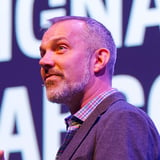Log in or create a free Rosenverse account to watch this video.
Log in Create free account100s of community videos are available to free members. Conference talks are generally available to Gold members.
Summary
There has been considerable discussion about impending reckonings and large-scale changes in our field. Our panelists explore what we believe to be the three most important tenets of these changes: The changing power dynamics between researcher and the researched What it means to expand the definition of researcher to include people who do research The convergence of different insight fields Together, let's unpack the possible futures ahead of us and the critical decisions we, as a field, need to make in order to move forward. Attend all of our Advancing Research community workshops Each free virtual workshop is made up of panelists who will share short provocations on engaging ideas to discuss as a group, as well as a leader in our field to moderate. If you're looking for discussions that challenge the status quo and can truly advance research, look no further than our workshop series. (P.S. We’ll be drawing most of our Advancing Research 2025 conference speakers from those who present at upcoming workshops—so tune in for a sneak peek of what's to come from #AR2025!) July 24, 4-5pm EDT Watch Video Theme 1: Democratization Working with it, not against August 7, 11am-12pm EDT Watch Video Theme 2: Collaboration Learning from market research, data science, customer experience, and more August 21, 4-5pm EDT Watch Video Theme 3: Communication Innovative techniques for making your voice heard September 4, 11am-12pm EDT Watch Video Theme 4: Methods Expanding the UXR toolkit beyond interviews September 18, 4-5pm EDT Watch Video Theme 5: Artificial Intelligence Passionate defenses, reasoned critiques, and practical application October 2, 11am-12pm EDT Register Theme 6: Junctures for UXR Possible futures and the critical decisions to move us forward October 16, 4-5pm EDT Watch Video Theme 7: Open Call Propose ideas that don’t match our other workshops’ themes
Key Insights
-
•
The UX research field is at a pivotal moment involving the biggest power dynamic shift researchers will experience in their careers.
-
•
Traditional expert authority in research is eroding due to cultural distrust and democratization of knowledge.
-
•
Research participants increasingly demand to be treated as equal collaborators, not just data sources.
-
•
Community-centered design focuses on centering lived experience and redistributing decision-making power.
-
•
Framing power in terms of possibility rather than solely oppression encourages collaboration and resource sharing.
-
•
Trauma-informed research practices are crucial but often overlooked in commercial UX projects.
-
•
Practical power-shifting tools include inclusive problem framing, plain language use, and co-facilitation.
-
•
Scheduling and participation structures often reinforce power imbalances, especially in public service research.
-
•
Reimagining research compensation as reciprocal exchange broadens meaningful participant engagement.
-
•
Research is an ongoing, living process that should include transferring skills to communities for sustained impact.
Notable Quotes
"This is probably the biggest change we are going to see within our working careers."
"Research participants are demanding that we see them as equals rather than vessels to extract knowledge from."
"The table needs to be larger, longer, or maybe a circle of people without a table to include more voices."
"It is okay to be vulnerable as a facilitator and to ask for co-facilitation with someone closer to the problem."
"Most human-centered design tools intellectualize the process and leave many stakeholders undervalued and disconnected."
"If people are complaining about the present, it’s very difficult to imagine a future without addressing current challenges."
"The people who work traditional hours are not the end all be all of the world when designing research participation."
"We need to reframe compensation around reciprocal exchange, not just monetary incentives."
"I highly recommend all researchers put themselves in the position of participants to understand that experience."
"Research doesn’t start and end with the researcher; it’s about continual learning and supporting communities to keep learning."
Or choose a question:
















More Videos

"When you design for the edges, you make things better, more fluid, more customizable for everyone."
Sam ProulxOnline Shopping: Designing an Accessible Experience
June 7, 2023

"We built a career path to make evaluations as fair and consistent as possible across roles."
Ignacio MartinezFair and Effective Designer Evaluation
September 25, 2024

"Design pairs gave strength in numbers, faster turnarounds, and more impact especially when paired with product managers."
Sarah Kinkade Mariana Ortiz-ReyesDesign Management Models in the Face of Transformation
June 8, 2022

"The Shakers patented clever affordances like chair buttons that let you rock without damaging wooden floors."
Daniel GloydWarming the User Experience: Lessons from America's first and most radical human-centered designers
May 9, 2024

"Journalists like me are in the business of interrogating reality to get at the truth."
Patrick BoehlerFishing for Real Needs: Reimagining Journalism Needs with AI
June 10, 2025

"There’s a big merger in this space and two UX giants haven’t been behaving nicely, introducing higher prices and stricter commercial terms."
Andy Barraclough Betsy NelsonFrom Costly Complexity to Efficient Insights: Why UX Teams Are Switching To Voxpopme
September 23, 2024

"The future of our technology cannot and should not rest solely on the ethics of individual designers."
Alexandra SchmidtWhy Ethics Can't Save Tech
November 18, 2022

"Please don’t implement the Spotify model. It works for them, it won’t work for you."
Louis RosenfeldDiscussion: What Operations can teach DesignOps
November 6, 2017

"Previously, IBM designers were inventing their own buttons for every product, which exasperated chaos and inconsistency."
Mitchell BernsteinOrganizing Chaos: How IBM is Defining Design Systems with Sketch for an Ever-Changing AI Landscape
September 29, 2021


















